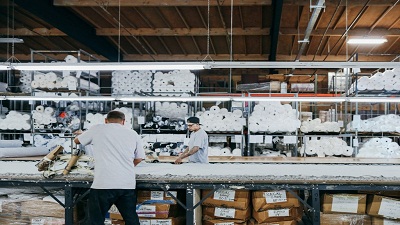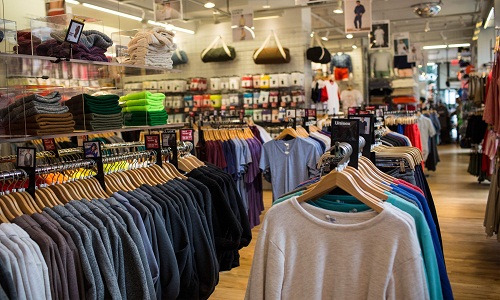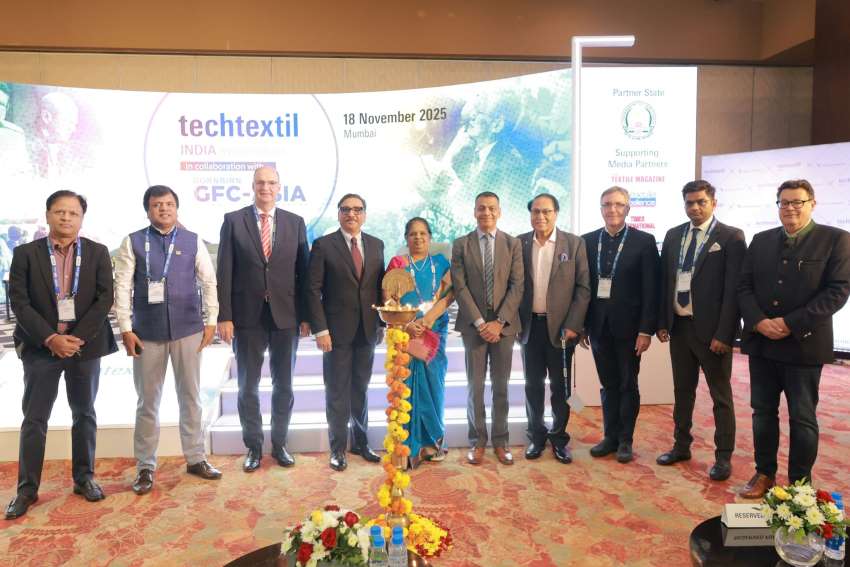While there are plenty of challenges with making products in the US, finding solutions to these hard problems is what seems to make these companies tick. These new manufacturers believe that jobs in Shenzhen (China) are just as important to the families in Shenzhen as they are to American families. For them, there is something cool about the fact that American-made clothing companies are disproving what they have been told for the last 40 years about how American manufacturing is dead.

There are plenty of challenges with making products in the US, finding solutions to these hard problems is what seems to make these companies tick. Three year old Yogasmoga started by Rishi Bali, Founder and CEO manufactures om-inducing clothes 60 miles south of Boston in the gritty town of Fall River, Massachusetts. In the 19th century, Fall River was an important textile hub in New England, second in the world only to Manchester, England, in terms of textile production. Over the last few decades, majority of factories in these parts have shut down as manufacturing has moved offshore to places such as China and Vietnam, where labour is cheaper.

However, Bali wanted to create his own technical fabrics, monitor quality, and have the flexibility to scale up his business as quickly as possible. He believes the only way he was able to accomplish these goals was to set up production in the US. And this decision is paying off: Last year, the company had a valuation of $74 million and opened its 12th store. By using local factories, Bali is able to meet demand much quicker.
Bali is part of a nascent trend of clothing startups bringing business back to American factories. Over the past two decades, there was a 90 per cent decline in apparel manufacturing industry in the US, from 940,000 jobs in 1990 to 136,000 in 2015. This has been in part due to the Trans-Pacific Partnerships, which provide incentives such as lower tariffs for companies that want to produce clothes overseas - though the merits of free trade have been hotly contested in this election cycle.
Manufacturing to remain stable
Now after a mass exodus of manufacturing jobs overseas, in 2012 local manufacturing began to stabilise, believes Bob Bland, Founder and CEO of Manufacture New York, an organization that helps fashion startups create their products in New York City. Part of this shift can be attributed to clothing startups that have started moving back into American factories instead of instinctively going overseas. Bland also believes that these numbers underestimate how much work is being done in the US because many fashion designers and artisans are not being counted by Bureau of Labor Statistics.
For fledgling companies, there are some benefits to work locally. While clothes cost less per unit, one needs significant capital to even begin production. This is what Sasha Koehn and Erik Schnakenberg discovered when they decided to launch the Los Angeles-based menswear label Buck Mason in 2014. Their goal was to produce American-made basics: simple T-shirts, jeans, and button-downs. They together put in $5,000 each and found a local factory in LA to make the tees. That entire budget would have been eaten up on our plane ticket to China. By selling initial products online, they were able to start making others. By year two, they were pulling in several million dollars in sales and opening their first physical store.
Kate Bowen and Ashley Wayman, who launched children's wear brand Petit Peony a year and a half ago, have a similar experience. They explored local factories to see what the minimum order was to start production. They ended up at Griffin, the same factory that Yogasmoga uses, where they only needed to purchase 1,000 units in each print and size to secure a contract.
Can startups grow to mainstream?
While small startups are finding some immediate benefits to creating products in local factories, manufacturing in the US can only begin to compete with overseas in terms of quality, speed to market, and even cost, when they are able to scale up. One good example of this is American Giant, a four-year old company founded by Bayard Winthrop, known for creating durable American-made sweatshirts that have garnered a cult following. Winthrop has observed that while manufacturing abroad drives down labour costs, it also requires companies to mark up their products because a significant chunk of their inventory will never get sold - some products will be discarded because of poor quality, slow turnaround time means that some clothes will no longer be fashionable when they reach stores, and designers often make bad bets on color schemes or patterns and aren't able to withdraw orders.
American-made products will never be as cheap as the $3 T-shirts sold at H&M or Primark. American Giant sweatshirts cost around $90, which places them on par with those at Banana Republic or J Crew. However, CEOs who make products locally argue that customers are getting much better value.
But not all startups are able to grow as quickly as American Giant and Yogasmoga, and take advantage of the economic efficiencies that occur at such a large scale. Companies committed to manufacturing locally are innovating at the level of fabric and design, but they also have to be creative in terms of the entire supply chain.
While there are plenty of challenges with making products in the US, finding solutions to these hard problems is what seems to make these companies tick. These new manufacturers believe that jobs in Shenzhen (China) are just as important to the families in Shenzhen as they are to American families. For them, there is something cool about the fact that American-made clothing companies are disproving what they have been told for the last 40 years about how American manufacturing is dead.












